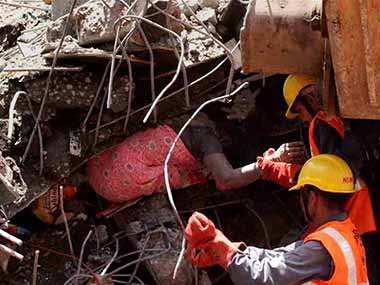Three diverse issues but all of them have one primary character, lack of accountability.
The first is the collapse of an illegal construction in Mumbai leading to 75 lives (still counting) being lost. The second is a statement made by the deputy chief minister of Mumbai, Ajit Pawar who ridiculed demands for water and power by the electorate. The third is the beating up of a cop by legislators in Mumbai, resulting in the public becoming even more wary of being given protection by the state. The fact that all these issues happened in Maharashtra is just coincidental, one or more of these issues can and has happened in many other Indian states as well. The reason it will keep happening over and over again is the lack of accountability by elected representatives to the very people who vote for them.
[caption id=“attachment_689974” align=“alignleft” width=“380”] Will India see accountability in its economy? PTI[/caption]
The lack of accountability exhibited by elected officials pervades to other areas of the economy as well. It is seen in the ongoing tussle between the capital market regulator Sebi and the RNBC (Residuary Non Banking Company) Sahara, where the SC has ordered Sebi to make sure that Sahara returns Rs 24,000 crore collected from investors. Sebi has already spent Rs 55 crore in trying to implement the SC order but it is nowhere near completion of its task. Sahara in the meanwhile is merrily acquiring hotels abroad and running its IPL (Indian Premier League) franchisee, the Pune Warriors.
Lack of accountability is seen in the NREGA (National Rural Employment Guarantee Act) where paychecks are received by the corrupt in the name of dead, disabled and elderly. CBI (Central Bureau of Investigation) is probing an Rs 5900 crore NREGA scam in Bihar. Government induced farm loan waiver scheme of 2008 for Rs 60,000 crore by banks have seen scams with the CAG (Comptroller and Auditor General) exposing irregularities in the loan waiver programme.
Food subsidy scams are estimated to be worth$14.5 billion as per an August 2012 Bloomberg report . Fuel mafia operates unchecked with a 2011 killing of a government official in Maharashtra highlighting their power.
Financial sector has seen its fair share of lack of accountability to public money. Scams such as Satyam Computers where the promoter siphoned off shareholders funds to gross mismanagement by promoters such as Vijay Mallya whose Kingfisher Airlines has collapsed leading to employees without pay and shareholders with huge losses. In fact promoters taking shareholders for a ride is a regular feature in India. Lenders too suffer the same fate as companies over borrow and then leave the lenders in a lurch. The case of Deccan Chronicle that borrowed well in excess of its capability to generate cash to pay off debts leaving high profile lenders in a lurch is a prime example of how big borrowers treat lenders.
Lack of accountability is seen in the trustees of public money. Insurance companies and mutual funds sell flavor of the day products such as unit linked plans and NFOs to investors. The product manufacturers do not have accountability to the investors who have invested in mis-sold products.
So where does this lack of accountability lead the economy to? The sharp decline in household savings in shares and debentures from levels of 13% of total financial savings in the 1990s to below 5% levels as of 2011 is a clear indication of a lack of trust by the public due to the lack of accountability of the takers of pubic money. Bank deposits account for around 60% of GDP while mutual funds retail assets account for less than 3% of GDP. Gold imports are seen as a major driver of high CAD (Current Account Deficit) that touched record highs of 6.7% of GDP in the third quarter of 2012-13. Real estate prices have bucked a flagging economy leading to unscrupulous builders reaping the riches at the cost of the hard working homebuyer.
Will India see accountability in its economy? In a democracy, accountability should be of primary importance but the fact is the public wariness translates into distrust rather than any constructive activism leading to below par growth for the country as money goes into unproductive assets. Unless public change their behavior pattern to make representatives more accountable, India’s growth will always lag its optimum growth potential.


)
)
)
)
)
)
)
)
)



